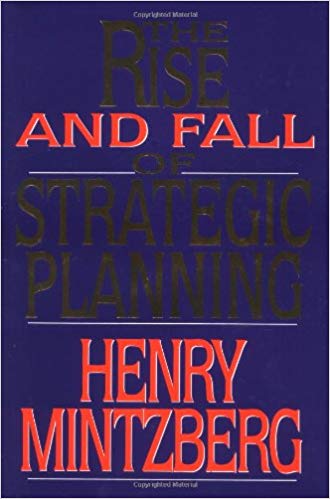In this definitive and revealing history, Henry Mintzberg, the iconoclastic former president of the Strategic Management Society, unmasks the press that has mesmerized so many organizations since 1965: strategic planning. One of our most brilliant and original management thinkers, Mintzberg concludes that the term is an oxymoron -- that strategy cannot be planned because planning is about analysis and strategy is about synthesis. That is why, he asserts, the process has failed so often and so dramatically.
Mintzberg traces the origins and history of strategic planning through its prominence and subsequent fall. He argues that we must reconceive the process by which strategies are created -- by emphasizing informal learning and personal vision -- and the roles that can be played by planners. Mintzberg proposes new and unusual definitions of planning and strategy, and examines in novel and insightful ways the various models of strategic planning and the evidence of why they failed. Reviewing the so-called "pitfalls" of planning, he shows how the process itself can destroy commitment, narrow a company's vision, discourage change, and breed an atmosphere of politics. In a harsh critique of many sacred cows, he describes three basic fallacies of the process -- that discontinuities can be predicted, that strategists can be detached from the operations of the organization, and that the process of strategy-making itself can be formalized.
Mintzberg devotes a substantial section to the new role for planning, plans, and planners, not inside the strategy-making process, but in support of it, providing some of its inputs and sometimes programming its outputs as well as encouraging strategic thinking in general. This book is required reading for anyone in an organization who is influenced by the planning or the strategy-making processes.
چکیده فارسی
در این تاریخ قطعی و آشکار، هنری مینتزبرگ، رئیس نمادین سابق انجمن مدیریت استراتژیک، نقاب مطبوعاتی را که از سال 1965 تاکنون سازمانهای بسیاری را مسحور کرده است، میکشد: برنامهریزی استراتژیک. یکی از درخشانترین و اصیلترین متفکران مدیریت ما، مینتزبرگ به این نتیجه میرسد که این اصطلاح یک واژه بدبین است -- که استراتژی را نمیتوان برنامهریزی کرد زیرا برنامهریزی درباره تجزیه و تحلیل است و استراتژی در مورد ترکیب است. به همین دلیل است که او ادعا می کند، این روند اغلب و به طرز چشمگیری شکست خورده است.
مینتزبرگ ریشه ها و تاریخچه برنامه ریزی استراتژیک را از طریق برجستگی و سقوط بعدی آن دنبال می کند. او استدلال میکند که ما باید فرآیند ایجاد استراتژیها - با تأکید بر یادگیری غیررسمی و بینش شخصی - و نقشهایی را که برنامهریزان میتوانند ایفا کنند، دوباره درک کنیم. مینتزبرگ تعاریف جدید و غیرمعمولی از برنامه ریزی و استراتژی ارائه می دهد و مدل های مختلف برنامه ریزی استراتژیک و شواهد شکست آنها را به شیوه های بدیع و روشنی بررسی می کند. او با مرور به اصطلاح «تلههای» برنامهریزی، نشان میدهد که چگونه خود فرآیند میتواند تعهد را از بین ببرد، چشمانداز یک شرکت را محدود کند، از تغییر دلسرد کند و فضای سیاسی را ایجاد کند. او در نقدی شدید بر بسیاری از گاوهای مقدس، سه اشتباه اساسی در این فرآیند را توصیف میکند - اینکه میتوان ناپیوستگیها را پیشبینی کرد، این که استراتژیستها را میتوان از عملیات سازمان جدا کرد، و اینکه خود فرآیند استراتژیسازی را میتوان رسمی کرد.
مینتزبرگ بخش مهمی را به نقش جدید برنامهریزی، برنامهریزی و برنامهریزان اختصاص میدهد، نه در درون فرآیند ساخت استراتژی، بلکه در حمایت از آن، ارائه برخی از ورودیهای آن و گاهی برنامهریزی خروجیهای آن و همچنین تشویق تفکر استراتژیک به طور کلی. خواندن این کتاب برای هرکسی در سازمانی که تحت تأثیر فرآیندهای برنامه ریزی یا استراتژی است، ضروری است.
ادامه ...
بستن ...
Ebook details:
عنوان: Rise and Fall of Strategic Planning (9781476754765) Henry Mintzberg
نویسنده: Books
ناشر: Free Press; 1 edition (June 29, 2013)
زبان: English
شابک: 1476754764, 978-1476754765
حجم: 3 Mb
فرمت: Epub
ادامه ...
بستن ...










